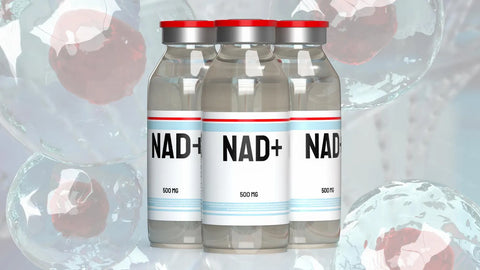In the world of health and aging, there's a lot of interest in how nicotinamide mononucleotide (NMN), resveratrol, and ginsenosides can help. NMN is important because it helps make a coenzyme called NAD+, which keeps our cells healthy and working well. Resveratrol, found in grapes and berries, is known for its ability to fight inflammation and help the heart and brain. Ginsenosides, from ginseng, can boost energy and improve brain function.

Researchers are now looking into how these three compounds work together to make us healthier as we age. By combining NMN, resveratrol, and ginsenosides, they hope to see if they can make our cells even healthier and help us age better. This study will explore how these supplements might team up to keep our cells in top shape and promote healthy aging.
Understanding NAD+ and Its Importance
Nicotinamide adenine dinucleotide (NAD+) is a critical coenzyme found in all living cells. It plays a fundamental role in various biological processes, making it essential for overall health and vitality.
Importance of NAD+
NAD+ plays a vital role in how our cells generate energy. It helps in important processes like breaking down sugars, the citric acid cycle, and creating energy molecules called ATP. Additionally, NAD+ helps in repairing our DNA, sending signals within cells, and managing oxidative stress. This shows how crucial NAD+ is for keeping our cells healthy and balanced.
Role in Aging and Disease
As we get older, our levels of NAD+ decrease, which can lead to problems with our health and increase the risk of age-related diseases. When there's not enough NAD+, our cells don't work as well, making it harder to produce energy and repair DNA damage. This can contribute to various conditions like Alzheimer's, diabetes, and heart disease. So, keeping NAD+ levels up is important for maintaining good health as we age.
Therapeutic Potential
Because NAD+ is so important for our cells and can affect our health, many researchers are looking at ways to increase its levels. Some studies have shown that taking supplements like nicotinamide riboside (NR) and nicotinamide mononucleotide (NMN) can help raise NAD+ levels. This could be helpful in fighting off age-related issues and keeping our cells strong and healthy. So, by boosting NAD+ stores, these supplements might help us stay healthier as we get older.
Overview of NMN, Resveratrol, and Ginsenosides
Nicotinamide mononucleotide (NMN), resveratrol, and ginsenosides are three compounds that have gained attention for their potential health benefits. Each of these substances offers unique properties that may contribute to overall well-being and longevity.

NMN
Nicotinamide mononucleotide (NMN) is like a building block for a very important molecule in our bodies called nicotinamide adenine dinucleotide (NAD+). NAD+ is crucial for many things our cells do. By taking NMN supplements, we might be able to increase the levels of NAD+ in our bodies. This could help our cells work better, especially by giving a boost to our energy production in little energy factories called mitochondria. Plus, having more NAD+ might also help slow down some of the problems that come with getting older. So, by taking NMN, we could potentially improve our metabolism, keep our cells healthy, and maybe even fight off some of the effects of aging.
Resveratrol
Resveratrol is a special substance found in foods like grapes and berries, as well as some other plants. It's famous for being really good at fighting off harmful stuff in our bodies and reducing inflammation. Scientists have been looking into resveratrol because it might help protect us from diseases that become more common as we get older, like heart disease and problems with our brains. One cool thing about resveratrol is that it might even help us live longer by turning on special proteins in our cells called sirtuins. These proteins are like little guardians that help keep our cells healthy and working well, which could help us stay youthful for longer. So, by eating foods or taking supplements with resveratrol, we might be able to protect ourselves from diseases and maybe even live a longer, healthier life.
Ginsenosides
Ginsenosides are bioactive compounds found in ginseng, a traditional medicinal herb. Ginseng has been used for centuries in traditional medicine for its adaptogenic and immune-modulating properties. Ginsenosides exhibit various biological activities, including antioxidant, anti-inflammatory, and neuroprotective effects. Research suggests that ginsenosides may help improve cognitive function, enhance physical performance, and support overall vitality.
Study Design and Methodology
The design and methodology of a research study play a crucial role in determining the reliability and validity of its findings. This section provides an overview of the key components involved in designing and conducting a scientific study.

Study Objective
Before starting a study, researchers set specific goals to understand what they want to achieve and the boundaries of their research. These goals help them plan how to conduct the study and come up with questions or ideas to explore. It's like having a roadmap that guides them through the entire research process, from start to finish. By having clear objectives, researchers can stay focused and make sure their study is well-designed and meaningful.
Research Design
When researchers plan a study, they decide on the framework and strategy they'll use, which is called the research design. This design maps out how the study will be carried out, like what kind of study it will be, how long it will take, and where it will happen. There are different types of research designs, such as experiments where they test something specific, observations where they watch and record what happens naturally, and studies that look at a group of people over time, just to name a few. The choice of design depends on what the researchers want to find out and what tools and time they have available.
Participant Selection
When researchers choose who will be in their study, it's called participant selection. They have to find and invite people who fit the requirements for the study. This means they think about things like how many people they need, what age, gender, or background those people should have, and any specific conditions they need to meet. By carefully picking who participates, researchers aim to make sure their study represents the broader population and that their results can apply to other similar groups of people.
Data Collection Methods
Data collection methods encompass the techniques and tools used to gather information from study participants. These may include surveys, interviews, observations, medical tests, or experimental interventions. Researchers must carefully select appropriate data collection methods based on the research objectives and study design.
Data Analysis
When researchers analyze data, they carefully look at all the information they've gathered to answer their research questions or test their ideas. They organize and study the data to find patterns or trends that could give them insights. Depending on how the study was set up and what they're trying to learn, researchers might use different methods to analyze the data. They might use numbers and statistics to crunch the data and see if there are any significant differences or relationships between variables. Or they might use more descriptive or narrative methods to understand the data in more detail.
Ethical Considerations
In research involving people, ethics are really important. Researchers have to make sure they treat everyone involved fairly and respectfully. This means they have to get permission from people before they join the study, keep their personal information private, and make sure they're safe and comfortable throughout the whole process. Before starting the study, an independent group called an Institutional Review Board (IRB) checks that the study follows all the rules and ethical guidelines. They make sure researchers are doing everything right and looking out for the well-being of the participants. It's like having a trusted guardian overseeing the study to make sure everything is done in a way that's fair and ethical.

Summary
In summary, knowing the differences between NMN and NR is important for understanding their potential benefits. Both compounds have shown promise in increasing NAD+ levels and supporting cell functions, but they vary in how they work and their availability in the body. More research is needed to fully understand which one is more effective and how they can be used safely. It's also crucial to follow ethical guidelines to ensure the safety and well-being of participants in studies involving these compounds. By doing so, researchers can continue to explore their potential in promoting health and longevity.





